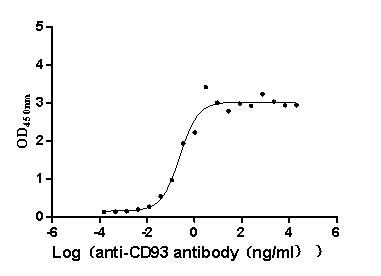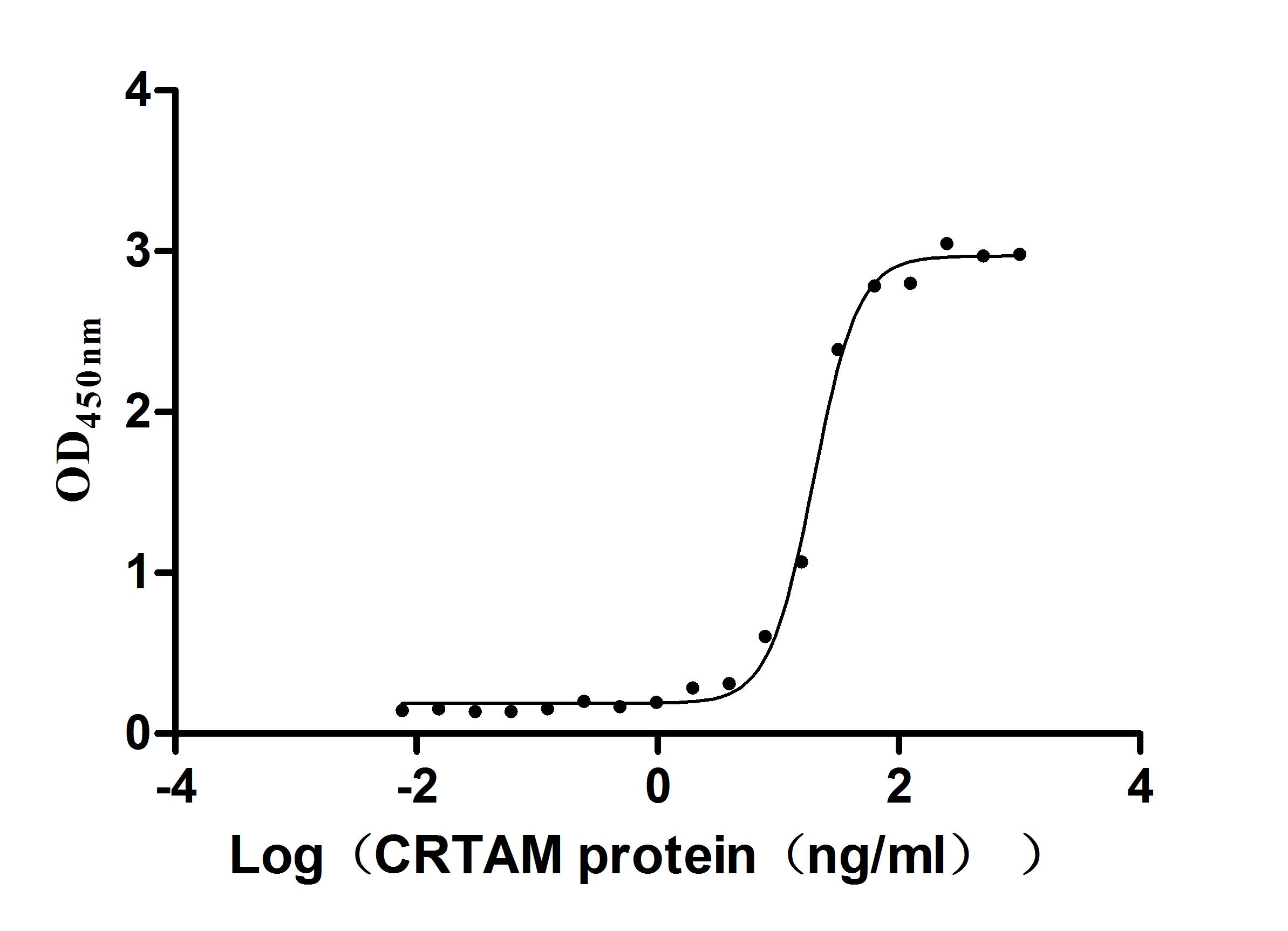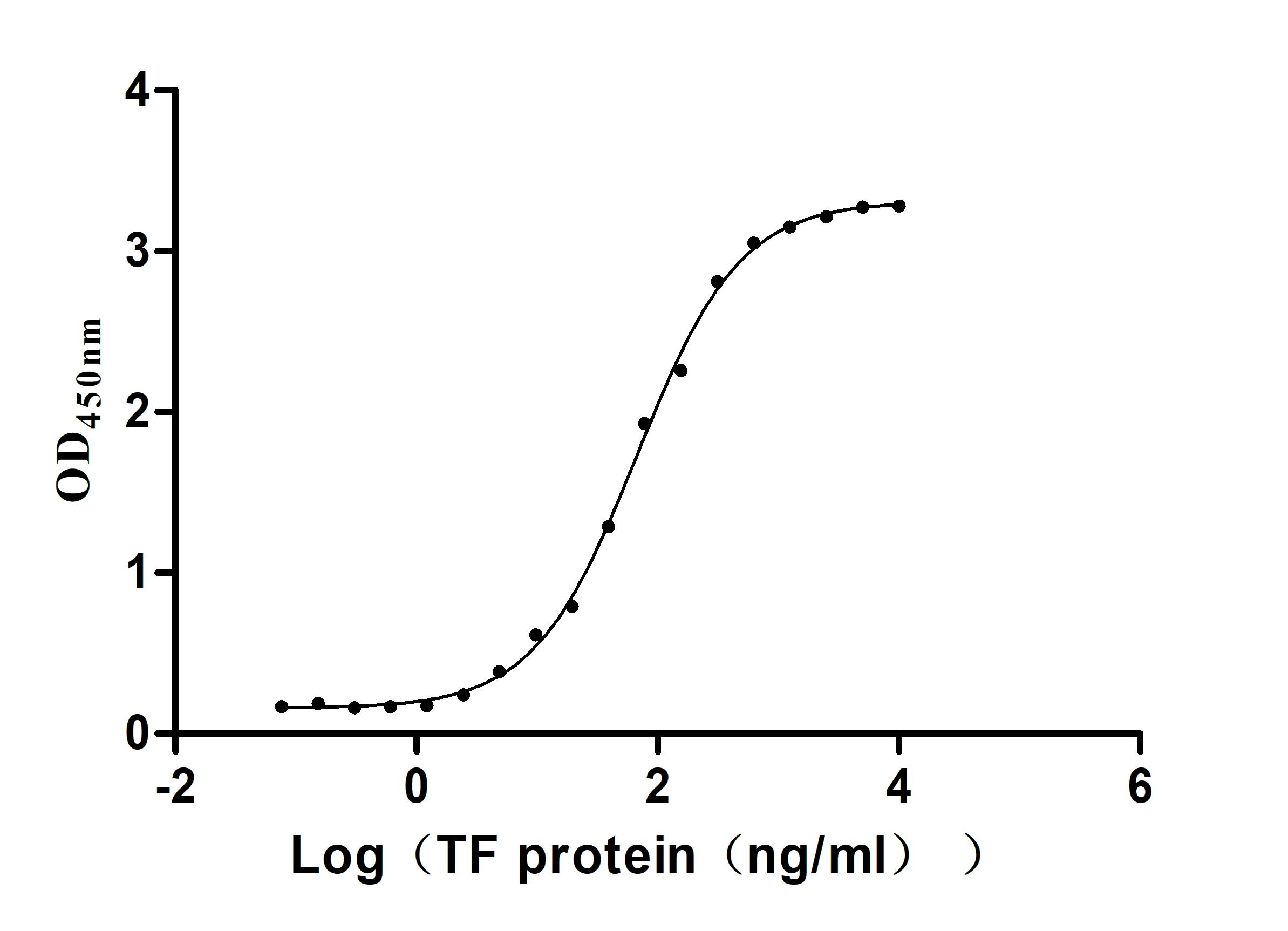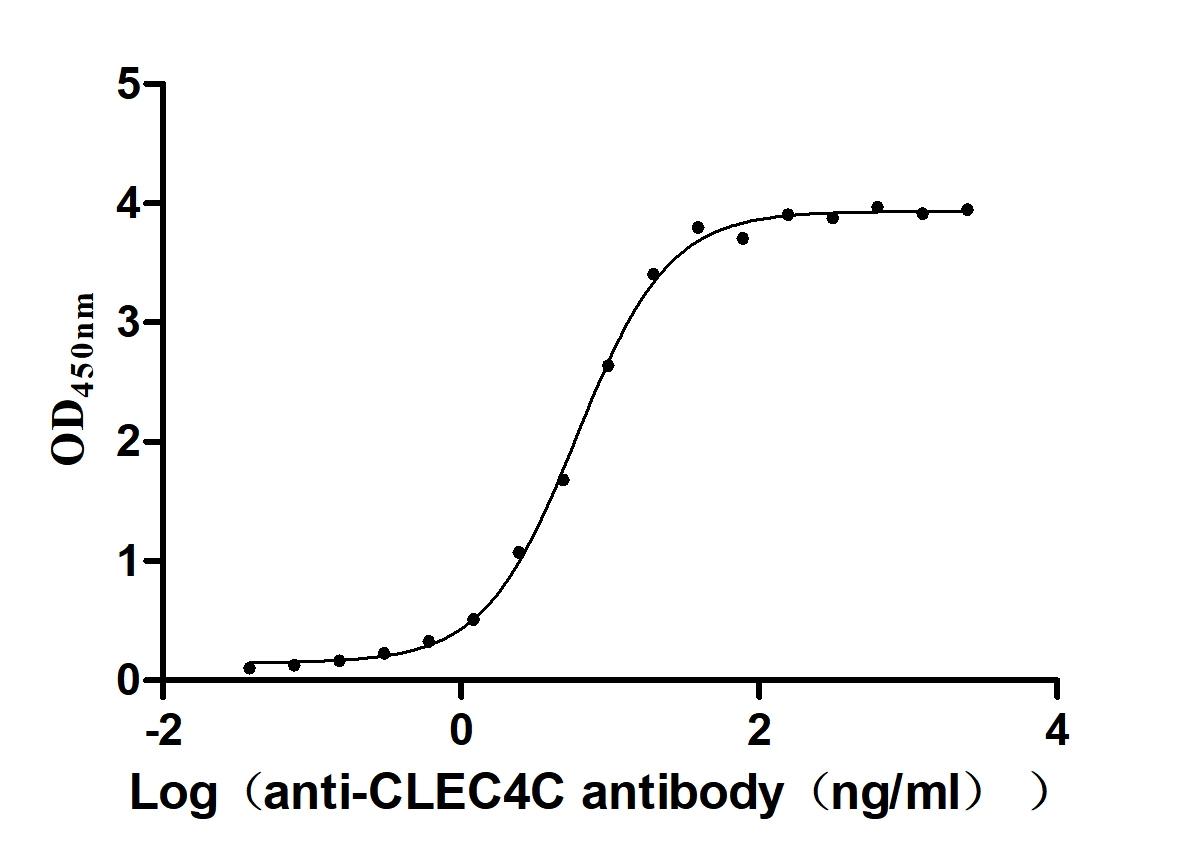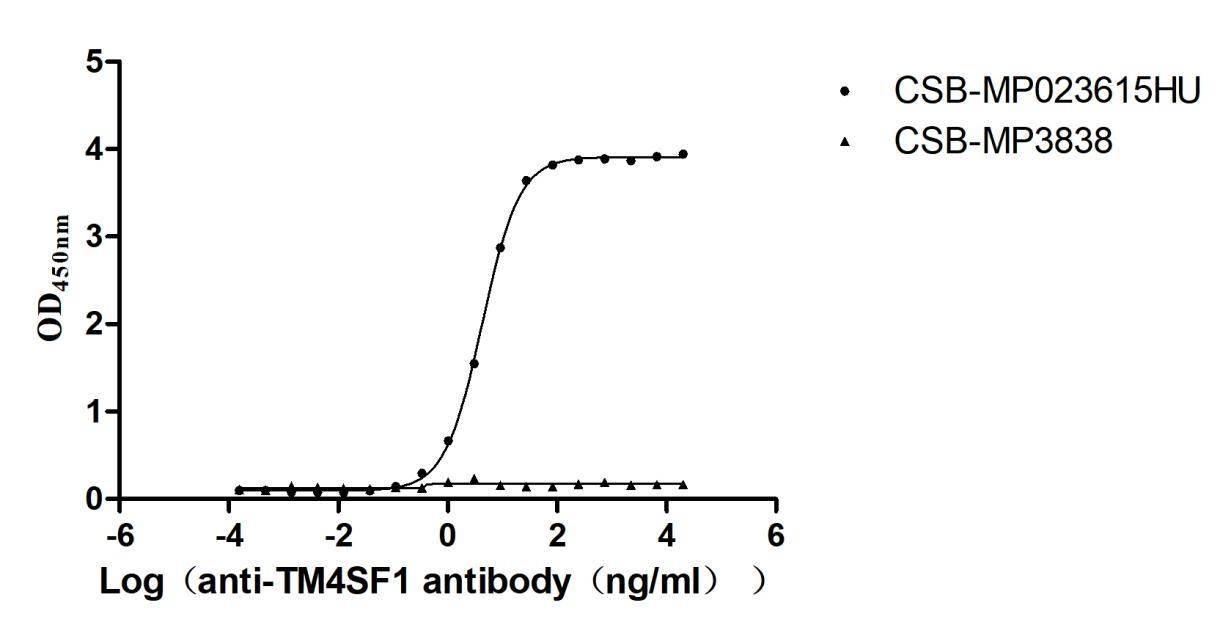Recombinant Mouse Mast cell protease 4 (Mcpt4)
-
中文名称:小鼠Mcpt4重组蛋白
-
货号:CSB-BP325157MO
-
规格:
-
来源:Baculovirus
-
其他:
-
中文名称:小鼠Mcpt4重组蛋白
-
货号:CSB-EP325157MO-B
-
规格:
-
来源:E.coli
-
共轭:Avi-tag Biotinylated
E. coli biotin ligase (BirA) is highly specific in covalently attaching biotin to the 15 amino acid AviTag peptide. This recombinant protein was biotinylated in vivo by AviTag-BirA technology, which method is BriA catalyzes amide linkage between the biotin and the specific lysine of the AviTag.
-
其他:
-
中文名称:小鼠Mcpt4重组蛋白
-
货号:CSB-MP325157MO
-
规格:
-
来源:Mammalian cell
-
其他:
产品详情
-
纯度:Greater than 85% as determined by SDS-PAGE.
-
基因名:Name:Mcpt4
-
Uniprot No.:
-
别名:Mast cell protease 4; Mcp 4; Mcpt4; MCPT4_MOUSE; MMCP 4; MMCP 4A; MMCP 4B; MMCP-4; MMCP4; MMCP4A; MMCP4B; MSMCP; Myonase; Serosal mast cell protease
-
种属:Mus musculus (Mouse)
-
蛋白长度:full length protein
-
表达区域:21-246
-
氨基酸序列IIGGVESRPH SRPYMAHLEI TTERGFTATC GGFLITRQFV MTAAHCSGRE ITVTLGAHDV SKTESTQQKI KVEKQIVHPK YNFYSNLHDI MLLKLQKKAK ETPSVNVIPL PRPSDFIKPG KMCRAAGWGR TGVTEPTSDT LREVKLRIMD KEACKNYWHY DYNLQVCVGS PRKKRSAYKG DSGGPLLCAG VAHGIVSYGR GDAKPPAVFT RISSYVPWIN RVIKGE
-
蛋白标签:Tag type will be determined during the manufacturing process.
The tag type will be determined during production process. If you have specified tag type, please tell us and we will develop the specified tag preferentially. -
产品提供形式:Lyophilized powder
Note: We will preferentially ship the format that we have in stock, however, if you have any special requirement for the format, please remark your requirement when placing the order, we will prepare according to your demand. -
复溶:We recommend that this vial be briefly centrifuged prior to opening to bring the contents to the bottom. Please reconstitute protein in deionized sterile water to a concentration of 0.1-1.0 mg/mL.We recommend to add 5-50% of glycerol (final concentration) and aliquot for long-term storage at -20℃/-80℃. Our default final concentration of glycerol is 50%. Customers could use it as reference.
-
储存条件:Store at -20°C/-80°C upon receipt, aliquoting is necessary for mutiple use. Avoid repeated freeze-thaw cycles.
-
保质期:The shelf life is related to many factors, storage state, buffer ingredients, storage temperature and the stability of the protein itself.
Generally, the shelf life of liquid form is 6 months at -20°C/-80°C. The shelf life of lyophilized form is 12 months at -20°C/-80°C. -
货期:Delivery time may differ from different purchasing way or location, please kindly consult your local distributors for specific delivery time.Note: All of our proteins are default shipped with normal blue ice packs, if you request to ship with dry ice, please communicate with us in advance and extra fees will be charged.
-
注意事项:Repeated freezing and thawing is not recommended. Store working aliquots at 4°C for up to one week.
-
Datasheet :Please contact us to get it.
相关产品
靶点详情
-
功能:Has chymotrypsin-like activity. Hydrolyzes the amide bonds of synthetic substrates having Tyr and Phe residues at the P1 position. Preferentially hydrolyzes the 'Tyr-4-|-Ile-5' bond of angiotensin I and the 'Phe-20-|-Ala-21' bond of amyloid beta-protein, and is less active towards the 'Phe-8-|-His-9' bond of angiotensin I and the 'Phe-4-|-Ala-5' and 'Tyr-10-|-Glu-11' bonds of amyloid beta-protein. Involved in thrombin regulation and fibronectin processing.
-
基因功能参考文献:
- deletion of the gene encoding MMCP-4 (Mcpt4), markedly reduced late, but not early, infarct size by suppressing IGF-1 degradation and, consequently, diminished cardiac dysfunction and adverse structural remodeling PMID: 27274047
- study supports a role for mMCP-4 in the early inflammatory phases of the disease in a mouse model of MS. PMID: 27610007
- These results suggest that the inhibition of mMCP-4 reduces lesion spreading in the earlier phases of atherosclerosis development and can help stabilise the more advanced plaque PMID: 26976326
- Results suggest that mouse mast cell proteases 4, 5, and 6 are mediators of the critical role mast cells play in microdeformational wound therapy in the proliferative phase of healing. PMID: 24814421
- Data indicate that a second-degree burn injury can initiate an immediate novel zonal degranulation of mast cell throughout all skin layers and a disruption of the epidermal tight junctions dependent on the nonredundant presence of mMCP4 and mMCP5. PMID: 24523504
- these results support the conclusion that mast cells can contribute to the initial lung injury induced by bleomycin through release of the MCPT4 chymase. PMID: 24453258
- knock-outs demonstrate elevated airway reactivity and eosinophilia, and higher levels of serum immunoglobulin E PMID: 23235745
- Mast cell chymase degrades the alarmins heat shock protein 70, biglycan, HMGB1, and interleukin-33 (IL-33) and limits danger-induced inflammation. PMID: 24257755
- Mast cell released mMCP4 has anti-fibrotic potential in acutely induced obstructive nephropathy. PMID: 23515052
- Data from Mcp-4 (mast cell protease 4) knockout mice suggest Mcp-4 plays a pivotal role in the dynamic (in vivo and in vitro) conversion of systemic Big-endothelin-1 to endothelin-1 (1-31). PMID: 23596057
- MCs exert protective functions after trauma, at least in part via mMCP-4, by suppressing exacerbated inflammation via their proteases. PMID: 23193170
- The effects of interactions between mMCP-4 and TNF in vivo by analyzing the features of a classic model of polymicrobial sepsis, were assessed. PMID: 22901752
- mMCP-4 plays two different roles in the pathogenesis of experimental BP, by both activating MMP-9 and by cleaving BP180, leading to injury of the hemidesmosomes and extracellular matrix of the basement membrane zone. PMID: 21880713
- mMCP-4-deficient mice but not to mMCP-5-deficient mice revealing nonredundant actions for these two MC proteases in a model of innate inflammatory injury with remodeling. PMID: 21076070
- MCP-4 contributes locally to the aggravation of glomerulonephritis by mediating a variety of proinflammatory effects. PMID: 20530261
- mice deficient in mast cells (Kit(W-sh/W-sh) [Wsh]) or mast cell chymase (Mcpt4(-/-)) have significantly decreased basal small intestinal permeability compared with wild-type (WT) mice PMID: 20018751
- localization in skeletal muscle myofibrils PMID: 12204111
- Data describe a mouse strain with a targeted deletion in the gene for mast cell protease 4 (mMCP-4), in terms of tissue localization and functional properties. PMID: 12900518
- mast cell mMCP-4, -5, and -6 (chymase and tryptase) participate in the acute inflammation and remodeling process of viral myocarditis. PMID: 14578624
- mast cell chymase and CPA have key roles in both the generation and degradation of Ang II PMID: 15173164
- key role for mast cell chymase in the regulation of pro-MMP-2 and -9 activities (mast cell chymase AND pro-mmp-2 AND -9) PMID: 15615702
- Mast cell protease 4 reduces the antibody response and the severity of disease in autoimmune arthritis. PMID: 19010978
- abdominal aortic aneurysm lesions in Mcpt4(-/-) mice had fewer inflammatory cells and less apoptosis, angiogenesis, and elastin fragmentation than those of WT mice PMID: 19720934
- chymase (MCP-4) present in the upper airways protects against allergic airway responses, possibly by regulating smooth muscle cells. PMID: 19841188
显示更多
收起更多
-
蛋白家族:Peptidase S1 family, Granzyme subfamily
-
组织特异性:Submucosal mast cells. In femoral muscle, detected in myocytes but not in mast cells.
-
数据库链接:
KEGG: mmu:17227
STRING: 10090.ENSMUSP00000038103
UniGene: Mm.439684
Most popular with customers
-
Express system: Mammalian cell
Species: Homo sapiens (Human)
-
Recombinant Human HLA class II histocompatibility antigen gamma chain (CD74), partial (Active)
Express system: Mammalian cell
Species: Homo sapiens (Human)
-
Recombinant Human Angiopoietin-2 (ANGPT2) (Active)
Express system: Mammalian cell
Species: Homo sapiens (Human)
-
Recombinant Macaca fascicularis CD93 molecule (CD93), partial (Active)
Express system: Mammalian cell
Species: Macaca fascicularis (Crab-eating macaque) (Cynomolgus monkey)
-
Recombinant Human Cell adhesion molecule 1 (CADM1), partial (Active)
Express system: Mammalian cell
Species: Homo sapiens (Human)
-
Recombinant Human Serotransferrin(TF) (Active)
Express system: Mammalian cell
Species: Homo sapiens (Human)
-
Recombinant Macaca fascicularis C-type lectin domain family 4 member C(CLEC4C), partial (Active)
Express system: Mammalian cell
Species: Macaca fascicularis (Crab-eating macaque) (Cynomolgus monkey)
-
Recombinant Human Transmembrane 4 L6 family member 1(TM4SF1)-VLPs (Active)
Express system: Mammalian cell
Species: Homo sapiens (Human)


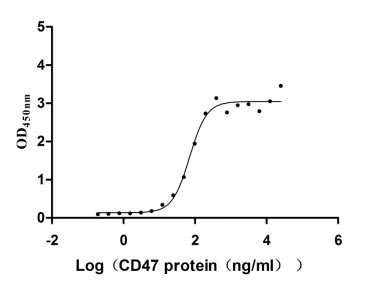
-AC1.jpg)
-AC1.jpg)
